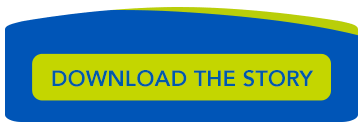Florida Developmental Education Reform:
How Colleges are Paving Pathways to Student Success
Small Class Sizes Make a Big Difference
for Daytona State Students
Cheyanne Gillespie didn’t exactly dread her English classes at Key West High School, but she certainly didn’t approach the subject with the same gusto she had for mathematics.
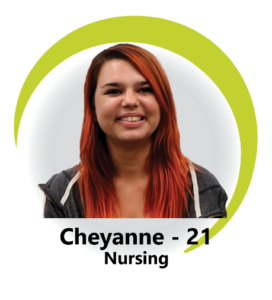 “I was extremely good at math, so I took a ton of math classes,” Cheyanne said. The 21-year-old student is currently enrolled at Daytona State College where she is studying to become a nurse. “With English, I was ok at it. I was better at the creative aspect of it and constructing and annotating essays based off of literature because it was kind of analytical work.”
“I was extremely good at math, so I took a ton of math classes,” Cheyanne said. The 21-year-old student is currently enrolled at Daytona State College where she is studying to become a nurse. “With English, I was ok at it. I was better at the creative aspect of it and constructing and annotating essays based off of literature because it was kind of analytical work.”
Daytona State College served 26,613 students during the 2017-18 school year, according to the Florida Department of Education.1 The college was established in 1957 and currently has seven locations throughout Volusia and Flagler counties, including five campuses — Daytona Beach, DeLand, Deltona, New Smyrna Beach-Edgewater, Flagler-Palm Coast — the Advanced Technology College, and the News-Journal Center.
Although English classes aren’t Cheyanne’s strong suit, she is one of 130,000 students taking ENC1101: Introduction to Composition in the Florida College System.2 That includes 4,227 ENC1101 students at Daytona State during the 2017-18 school year.3 The course is a requirement for all associate’s and bachelor’s degrees at public colleges and universities.
To help bolster her chances of success, Cheyanne also enrolled in ENC0055L: The English Studio, a weekly, guided, non-credit bearing, one-hour lab that ENC1101 students at Daytona State may take as a co-requisite. The English Studio is made up of a facilitator and no more than 12 students.
In addition to helping with her composition class, the English Studio also helped her become acclimated to her new collegiate environment.
“The main aspect that was helpful for me, other than the peer editing, was being able to decode what my (composition) professor wanted from me,” Cheyanne said.
DEVELOPMENTAL EDUCATION REFORM — SB 1720
The English Studio was implemented at Daytona State after the Florida legislature passed Senate Bill 1720 in 2013, which made developmental education optional for most students at the state’s 28 Florida College System institutions.
Before SB 1720, incoming college students were required to take a college placement test like the P.E.R.T. (Postsecondary Education Readiness Test), the ACT or the SAT. Students testing below the “college ready” cut-off scores were required to enroll in non-credit developmental education classes with the intention of getting the instruction and support needed to be successful in college-level coursework.
In 2012-13, over 138,000 students were enrolled in developmental math, reading, or writing courses at Florida College System institutions.4 Given the open access mission of Florida’s state and community colleges and the support many incoming students need, the passing of SB 1720 posed significant challenges for the administrators and faculty tasked with implementing the changes.
COLLEGES RESPOND TO REFORM
The bill was a mandate for colleges to ditch the status quo and provided the opportunity to test new models of instructional delivery and support, like the English Studio at Daytona State College, implemented in Fall 2014.
Elizabeth Barnes, a faculty member in the college’s School of Humanities and Communication and Chair of Academic Support, said Daytona State was uniquely positioned to get the Studio up and running in response to the new legislation.
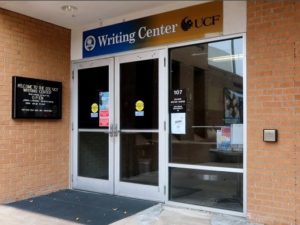 “We already had a robust student support structure with a history built on remedial support,” Barnes said. In fact, full-time learning and writing specialists from the Academic Support Center and Writing Center facilitate the majority of the Studios offered, in addition to tutoring and running workshops and test prep sessions.
“We already had a robust student support structure with a history built on remedial support,” Barnes said. In fact, full-time learning and writing specialists from the Academic Support Center and Writing Center facilitate the majority of the Studios offered, in addition to tutoring and running workshops and test prep sessions.
Dana Davidson, Associate Director of the Academic Support Center, is responsible for coordinating the English Studio. She says the college’s strength lies in its ability to consider what students need as they work toward their desired degrees.
“I feel like we do really well in terms of meeting students where they’re at,” Davidson said. “We realize students have a lot more going on, and you’ve got to try and address some of those needs first to help them be successful in school.”
WHO BENEFITS FROM THE ENGLISH STUDIO?
The English Studio serves students with diverse backgrounds, ranging from recent high school graduates to adults who are returning to college after years in the workforce. Almost one-third (31.8%) of the English Studio’s 418 students during 2017-18 were age 25 or above. Additionally, 67.5% of those English Studio students received some form of financial aid.5
“Oftentimes, these are students who haven’t gotten good feedback,” Barnes added. “They’re the ones we’re advocating for because they’re a little bit outside of the mainstream.”
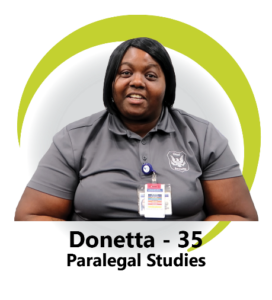 Donetta McFarlane is a 35-year-old single mother of 4 who initially stopped going to school in the 8th grade.
Donetta McFarlane is a 35-year-old single mother of 4 who initially stopped going to school in the 8th grade.
After earning her GED last year, Donetta is at Daytona State pursuing an Associate in Arts and wants to become a paralegal.
“I love doing research,” Donetta said. “I wanted to increase my income, so I came here.”
However, returning to a classroom for the first time in more than 20 years proved daunting. Donetta said the English Studio went a long way toward easing that transition.
“My regular classes have a lot more students, so I don’t talk and I don’t ask questions,” Donetta said. “With the Studio, there’s less than 10 of us, so I feel more comfortable talking.”
Prior to the reform, these students would have been placed in as many as 16 hours of developmental coursework before enrolling in ENC1101. In Fall 2013 — the final semester under the previous developmental education model — Daytona State dev ed students were passing ENC1101 at a rate of 55%. Following the introduction of the English Studio in Fall 2014, students who took the Studio and ENC1101 in the same semester passed ENC1101 at a rate of 62%. The pass rate for Fall 2017, the most recent fall term for which pass rate data are available, was 67%.6
 In 2015, the English Studio was chosen for one of eight case studies published by Jobs for the Future titled “Innovations in Developmental Education Redesign.” Barnes and Davidson were invited to discuss the Studio at the Division of Florida Colleges Connections Conference in May 2015. The duo was also recognized as Learning Resources Commission Exemplary Practice Recipients at the Association of Florida Colleges Annual Conference in November 2015.
In 2015, the English Studio was chosen for one of eight case studies published by Jobs for the Future titled “Innovations in Developmental Education Redesign.” Barnes and Davidson were invited to discuss the Studio at the Division of Florida Colleges Connections Conference in May 2015. The duo was also recognized as Learning Resources Commission Exemplary Practice Recipients at the Association of Florida Colleges Annual Conference in November 2015.
Although the English Studio is unlike any other classes students take, Davidson believes its status as a co-requisite for a gateway course like ENC1101 has contributed to its success.
“The studio is optional, but it works because they sign up for it, it’s on their schedule, they’re paying for it, and they’re getting a grade,” Davidson said.
Cheyanne, the nursing student from Key West, said the English Studio exceeded her expectations.
“I was told it was pretty much a study hall for English, but it ended up being much more helpful,” she said. “Study halls are quiet. You don’t have teachers, and you don’t ask questions.”
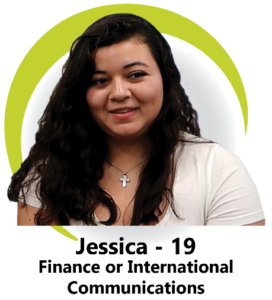 OVERCOMING THE LANGUAGE BARRIER
OVERCOMING THE LANGUAGE BARRIER
During her time in the English Studio, Cheyanne became friends with Jessica Orjuela, a 19-year-old student from Colombia. About 22% of English Studio students during 2017-18 were Hispanic, which was higher than the overall proportion of Hispanic students enrolled at Daytona State (17%) in Fall 2017.7 And while 63% of the college’s Fall 2017 enrollment was white, that figure dipped to 43.5% among English Studio students.8
Jessica says the Studio was an immense help in her composition class.
“When it comes to essays, I can sometimes struggle to get my point across,” said Jessica, who is interested in studying either finance or international communications. “My entire life happens in Spanish other than when I’m in school. It becomes hard to think about how to get a point across in English versus just having to think in Spanish.”
Jessica attended private school during elementary, middle, and high school, so the environment within the English Studio felt more familiar.
“It was a lot easier to get one-on-one time with a teacher and get the help that I needed to be ahead in class,” she said. “I can speak math all you want, but I still struggle a little with English. I would hope I could take what I learned here (in the Studio) with me to other places.”
Although Jessica has lived in Florida most of her life and is fluent in English, the English Studio also benefits international students for whom writing in English may be a challenge.
Mamadou Nianj — a 21-year-old student from Senegal who is fluent in French, Wolof, and English — moved to the U.S. in order to pursue his dream of being a commercial pilot. He is one of many Florida students taking advantage of the state’s 2+2 articulation policy, starting at a state or community college with a guarantee of admission to a public university once he completes his Associate in Arts degree.
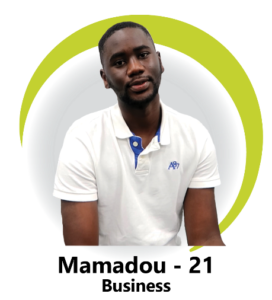 Mamadou plans to transfer from Daytona State to either the University of Central Florida or University of Florida to pursue a business degree.
Mamadou plans to transfer from Daytona State to either the University of Central Florida or University of Florida to pursue a business degree.
“As a pilot, you only need to have your pilot’s license, so the business degree is like my backup plan,” Mamdou said.
After previously visiting family in the area during summer vacation, Mamadou settled in Daytona Beach last year. Out of the three languages he speaks, English was the one that he had to work on the hardest upon arriving in the U.S.
“ENC1101 was my first real English class and there were writing rules I didn’t know about that were different from the (French) system I learned,” said Mamadou, who had studied English for seven years in Senegal. He took part in an accelerated, six-week version of the Studio last summer. “I wasn’t used to learning this way. That was one of the main reasons I took the English Studio.”
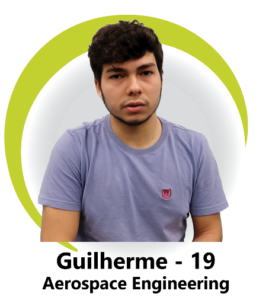 Another popular transfer destination for Daytona State College students is Embry-Riddle Aeronautical University, a private college that specializes in aviation and aerospace programs located less than a mile from Daytona State’s main campus.
Another popular transfer destination for Daytona State College students is Embry-Riddle Aeronautical University, a private college that specializes in aviation and aerospace programs located less than a mile from Daytona State’s main campus.
Guilherme Gobbo Pilotto, who moved to Daytona Beach from Brazil in Fall 2016, is working on his Associate in Arts at Daytona State with the goal of transferring to Embry-Riddle to study aerospace engineering. Guilherme is in his second year at Daytona State and took the English Studio during his first semester.
“I’d done six years of English classes (in Brazil), but when I got here it was totally different,” Guilherme said about adjusting to life in the U.S. “I felt like I couldn’t speak well. I did the studio during my first semester and it really helped me understand how classes worked.”
His initial plan was to enroll at Embry-Riddle, but the school’s $47,000 price tag proved to be too expensive.
But despite having a clear career path he wanted to pursue, Guilherme knew he had to succeed in his English classes for both academic and practical reasons.
“By the time I was taking ENC1101, I was also taking Chemistry, where I had to write term papers,” he said. “The English Studio really helped me a lot.”
SAFETY IN (SMALLER) NUMBERS
Smaller class environments like the English Studio can help students who are first in their family to attend college — or are new to the area like Guilherme — socialize, gain confidence, and learn how to interact with instructors.
Ben Graydon is an English professor in his ninth year at Daytona State. He serves as a facilitator in the English Studio.
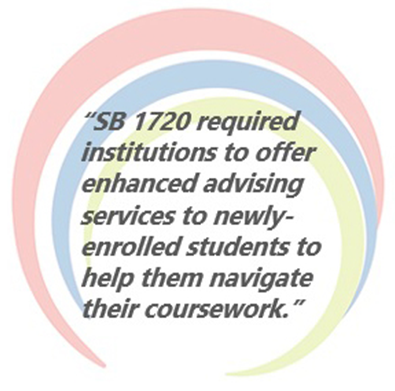 “It’s basically a weekly, scheduled, group Writing Center session,” Graydon said. “Some students will, especially those first few weeks, just lean back and sort of wait and see. Eventually, the students start thinking, ‘This girl next to me is getting an hour of free help’, and they start getting more involved.”
“It’s basically a weekly, scheduled, group Writing Center session,” Graydon said. “Some students will, especially those first few weeks, just lean back and sort of wait and see. Eventually, the students start thinking, ‘This girl next to me is getting an hour of free help’, and they start getting more involved.”
Graydon said these small group sessions have been especially valuable for students who might not realize some of their peers are also struggling with a particular aspect of their studies or college life.
“These group sessions are really nice because a lot of students feel like they’re the only ones who aren’t measuring up in certain facets,” he said.
Though many students have found the English Studio course helpful, the course is optional. The responsibility of guiding students who will benefit the most from the sort of support offered by the Studio falls on the shoulders of academic advisors, who have seen their role evolve over the last five years.
“Before [SB 1720], it was ‘These are your test scores, this is the class you’re going into,’” said Joshua Poniatowski, Assistant Director of Advising at Daytona State College. Today, students have a choice of whether to opt into developmental education or co-requisite courses like The English Studio.
SB 1720 required institutions to offer enhanced advising services to newly-enrolled students to help them navigate their coursework. Because most students are now exempt from taking college placement exams, Poniatowski and the other advisors at Daytona State now utilize multiple additional measures to schedule classes, including students’ GPA and performance in previous courses.
“There wasn’t that flexibility to have those sorts of conversations,” said Poniatowski, referring to his talks with students regarding their course options prior to SB 1720. “If they can see that we’re trying to make sure they’re successful in their classes, then an hour a week (for the English Studio) is really not that big of a time commitment in retrospect.”
Daytona State continues to offer a variety of resources — including an 84,000-square-foot Student Center/Workforce Transition Building that is currently under construction and scheduled to be completed in 2019 — to ensure all its students, including those in developmental education, are ready to meet the needs of the workforce after they graduate.
“We have a population of students that needs different support,” Davidson said. “They need extra support.”
REFERENCES
1Florida Department of Education, Division of Florida Colleges.
2Ibid.
3Florida Department of Education, Gateway Courses (EDStats Data Portal), https://edstats.fldoe.org/SASPortal/public.
4Florida Department of Education, Division of Florida Colleges.
5Florida Department of Education, Developmental Education Courses, (EDStats Data Portal), https://edstats.fldoe.org/SASPortal/public.
6Daytona State College, Office of Institutional Research.
7Florida Department of Education, Developmental Education Courses, (EDStats Data Portal), https://edstats.fldoe.org/SASPortal/public.
8College Navigator, “Daytona State College”. Washington DC: National Center for Education Statistics, 2018.

